Citroen JUMPER 2016 2.G Owner's Manual
Manufacturer: CITROEN, Model Year: 2016, Model line: JUMPER, Model: Citroen JUMPER 2016 2.GPages: 276, PDF Size: 8.93 MB
Page 141 of 276
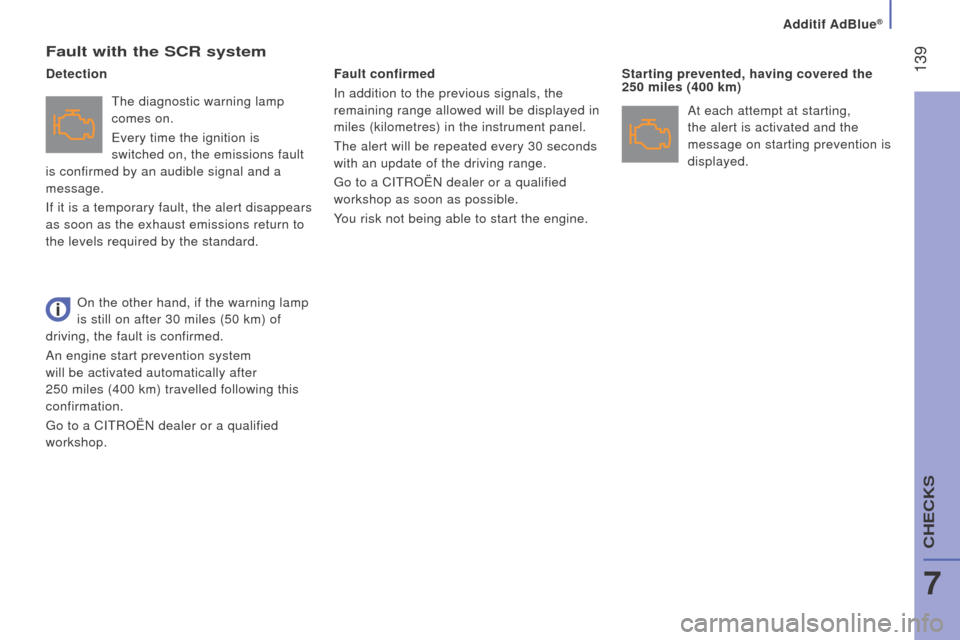
139
jumper_en_Chap07_Verifications_ed01-2015
Fault with the Scr system
The diagnostic warning lamp
comes on.
Every time the ignition is
switched on, the emissions fault
is confirmed by an audible signal and a
message.
i
f it is a temporary fault, the alert disappears
as soon as the exhaust emissions return to
the levels required by the standard. Fault confirmedi
n addition to the previous signals, the
remaining range allowed will be displayed in
miles (kilometres) in the instrument panel.
The alert will be repeated every 30 seconds
with an update of the driving range.
Go to a C
i T roën dealer or a qualified
workshop as soon as possible.
You risk not being able to start the engine. Starting prevented, having covered the
250 miles (400 km)
d
etection
At each attempt at starting,
the alert is activated and the
message on starting prevention is
displayed.
o
n the other hand, if the warning lamp
is still on after 30 miles (50 km) of
driving, the fault is confirmed.
An engine start prevention system
will be activated automatically after
250
miles (400 km) travelled following this
confirmation.
Go to a C
i
T roën dealer or a qualified
workshop.
Additif AdBlue®
7
CHECKS
Page 142 of 276
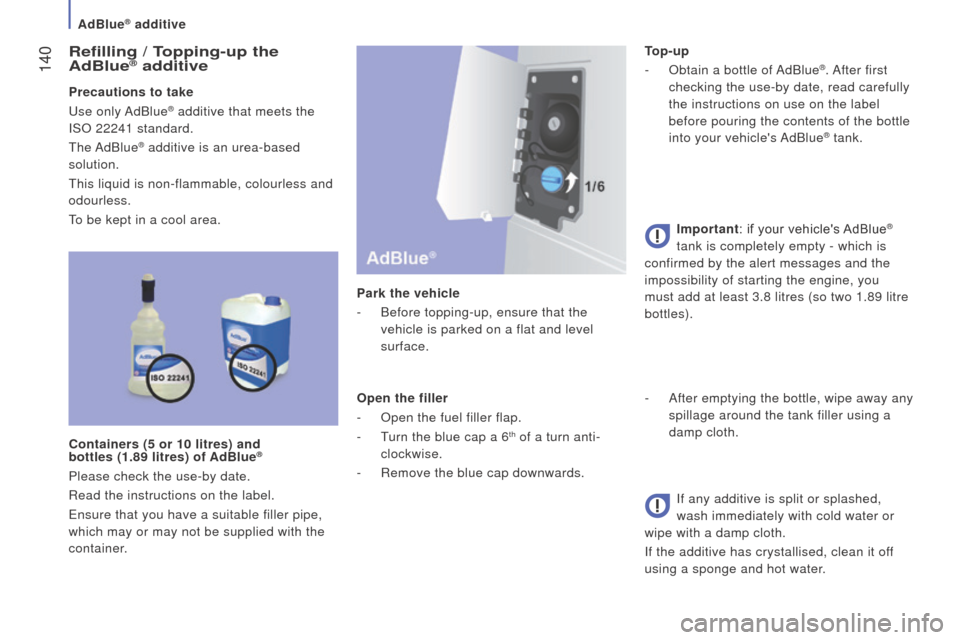
140
jumper_en_Chap07_Verifications_ed01-2015
refilling / topping-up the
AdBlue® additive
Precautions to take
Use only AdBlue® additive that meets the
i
S
o
22241 standard.
The AdBlue
® additive is an urea-based
solution.
This liquid is non-flammable, colourless and
odourless.
To be kept in a cool area.
c
ontainers (5 or 10 litres) and
bottles
(1.89 litres) of AdBlue
®
Please check the use-by date.
r
ead the instructions on the label.
Ensure that you have a suitable filler pipe,
which may or may not be supplied with the
container. Park the vehicle
-
Before topping-up, ensure that the
vehicle is parked on a flat and level
surface.
Open the filler
- o pen the fuel filler flap.
-
T
urn the blue cap a 6
th of a turn anti-
clockwise.
-
r
emove the blue cap downwards.
top-up
-
o btain a bottle of AdBlue
®. After first
checking the use-by date, read carefully
the instructions on use on the label
before pouring the contents of the bottle
into your vehicle's AdBlue
® tank.
Important: if your vehicle's AdBlue
®
tank is completely empty - which is
confirmed by the alert messages and the
impossibility of starting the engine, you
must add at least 3.8 litres (so two 1.89 litre
bottles).
-
After emptying the bottle, wipe away any
spillage around the tank filler using a
damp cloth.
i
f any additive is split or splashed,
wash immediately with cold water or
wipe with a damp cloth.
i
f the additive has crystallised, clean it off
using a sponge and hot water.
AdBlue® additive
Page 143 of 276
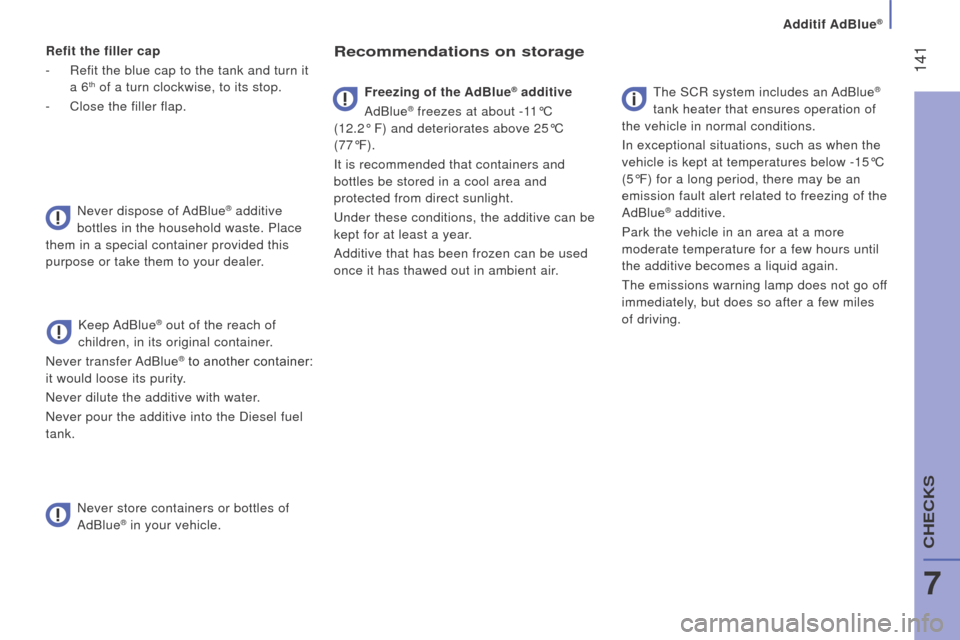
141
jumper_en_Chap07_Verifications_ed01-2015
refit the filler cap
- r efit the blue cap to the tank and turn it
a 6
th of a turn clockwise, to its stop.
-
Close the filler flap.
n
ever dispose of AdBlue
® additive
bottles in the household waste. Place
them in a special container provided this
purpose or take them to your dealer.
Keep AdBlue
® out of the reach of
children, in its original container.
n
ever transfer AdBlue
® to another container:
it would loose its purity.
n
ever dilute the additive with water.
n
ever pour the additive into the Diesel fuel
tank.
recommendations on storage
never store containers or bottles of
AdBlue® in your vehicle. Freezing of the AdBlue
® additive
AdBlue® freezes at about -11°C
(12.2°
F) and deteriorates above 25°C
(77°F).
i
t is recommended that containers and
bottles be stored in a cool area and
protected from direct sunlight.
Under these conditions, the additive can be
kept for at least a year.
Additive that has been frozen can be used
once it has thawed out in ambient air. The SC
r system includes an AdBlue
®
tank heater that ensures operation of
the vehicle in normal conditions.
i
n exceptional situations, such as when the
vehicle is kept at temperatures below -15°C
(5°F) for a long period, there may be an
emission fault alert related to freezing of the
AdBlue
® additive.
Park the vehicle in an area at a more
moderate temperature for a few hours until
the additive becomes a liquid again.
The emissions warning lamp does not go off
immediately, but does so after a few miles
of driving.
Additif AdBlue®
7
CHECKS
Page 144 of 276
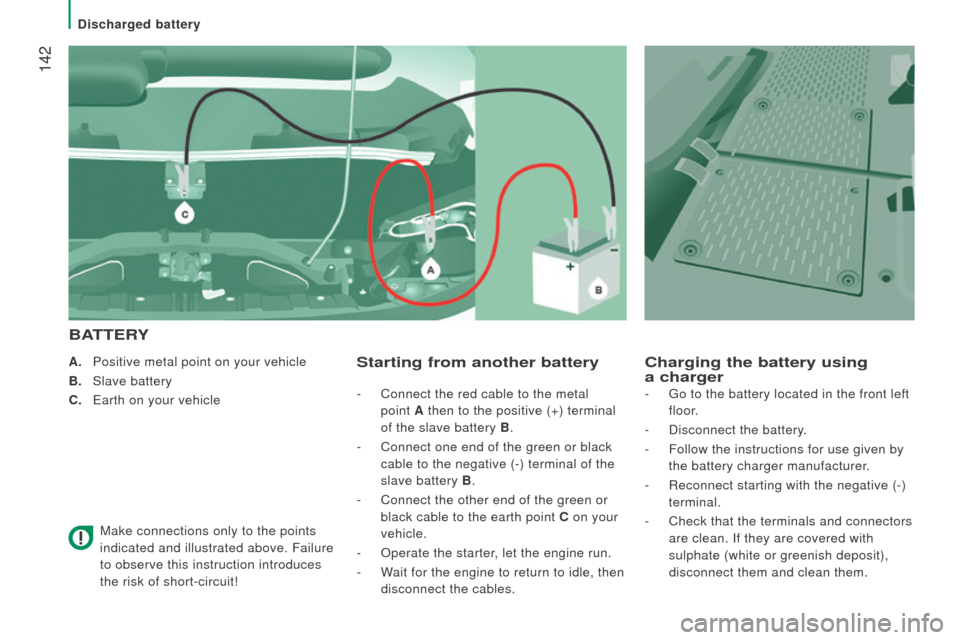
142
jumper_en_Chap08_Aide-rapide_ed01-2015
A. Positive metal point on your vehicle
B.
Slave battery
c
.
Earth on your vehicle
Make connections only to the points
indicated and illustrated above. Failure
to observe this instruction introduces
the risk of short-circuit!Starting from another battery
B
A
tt
E
r
Y
c
harging the battery using
a charger
- Connect the red cable to the metal
point
A then to the positive (+) terminal
of the slave battery B .
-
Connect one end of the green or black
cable to the negative (-) terminal of the
slave battery B .
-
Connect the other end of the green or
black cable to the earth point
c
on your
vehicle.
-
o perate the starter, let the engine run.
-
W
ait for the engine to return to idle, then
disconnect the cables. -
Go to the battery located in the front left
floor.
-
Disconnect the battery
.
-
Follow the instructions for use given by
the battery charger manufacturer.
-
r econnect starting with the negative (-)
terminal.
-
Check that the terminals and connectors
are clean.
i f they are covered with
sulphate (white or greenish deposit),
disconnect them and clean them.
Discharged battery
Page 145 of 276
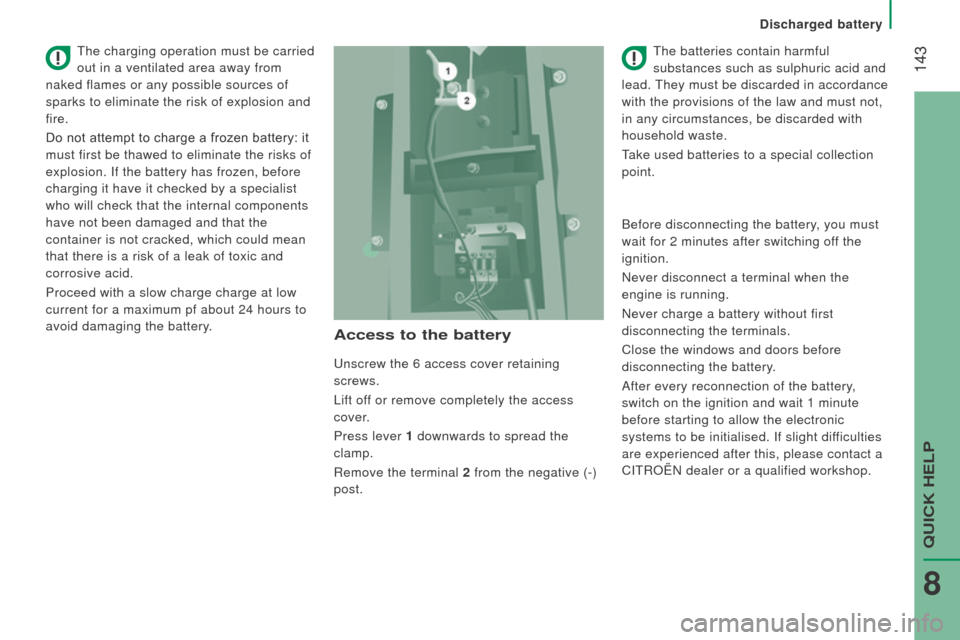
143
jumper_en_Chap08_Aide-rapide_ed01-2015
Access to the battery
Unscrew the 6 access cover retaining
screws.
Lift off or remove completely the access
cover.
Press lever 1 downwards to spread the
clamp.
r
emove the terminal 2 from the negative (-)
post. The batteries contain harmful
substances such as sulphuric acid and
lead. They must be discarded in accordance
with the provisions of the law and must not,
in any circumstances, be discarded with
household waste.
Take used batteries to a special collection
point.
The charging operation must be carried
out in a ventilated area away from
naked flames or any possible sources of
sparks to eliminate the risk of explosion and
fire.
Do not attempt to charge a frozen battery: it
must first be thawed to eliminate the risks of
explosion.
i
f the battery has frozen, before
charging it have it checked by a specialist
who will check that the internal components
have not been damaged and that the
container is not cracked, which could mean
that there is a risk of a leak of toxic and
corrosive acid.
Proceed with a slow charge charge at low
current for a maximum pf about 24 hours to
avoid damaging the battery. Before disconnecting the battery, you must
wait for 2 minutes after switching off the
ignition.
n
ever disconnect a terminal when the
engine is running.
n
ever charge a battery without first
disconnecting the terminals.
Close the windows and doors before
disconnecting the battery.
After every reconnection of the battery,
switch on the ignition and wait 1 minute
before starting to allow the electronic
systems to be initialised.
i f slight difficulties
are experienced after this, please contact a
C
i T roën dealer or a qualified workshop.
Discharged battery
QUiCK HELP
8
Page 146 of 276
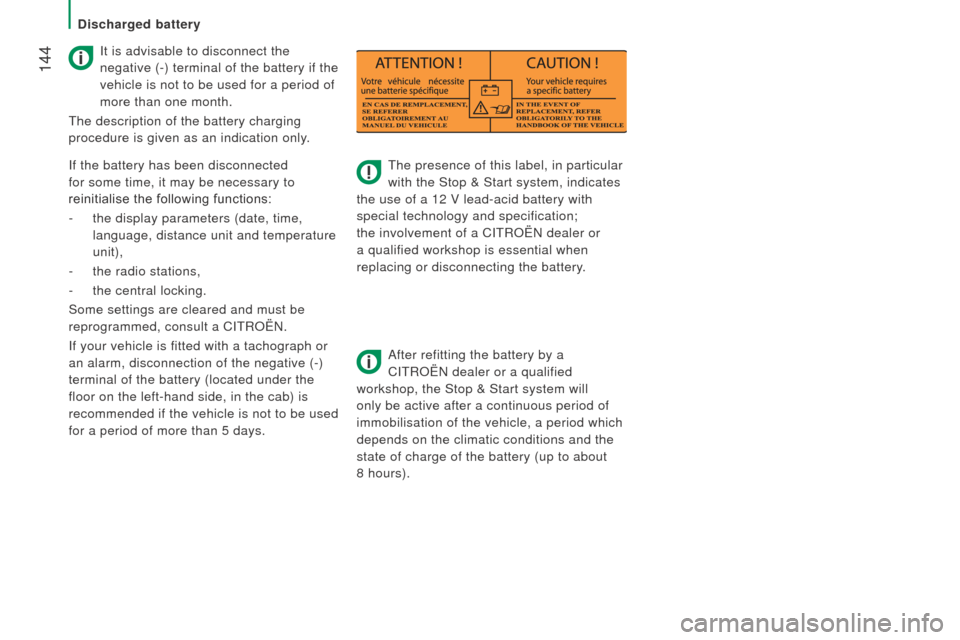
144
jumper_en_Chap08_Aide-rapide_ed01-2015
The presence of this label, in particular
with the Stop & Start system, indicates
the use of a 12 V lead-acid battery with
special technology and specification;
the involvement of a C
i T roën dealer or
a qualified workshop is essential when
replacing or disconnecting the battery.
After refitting the battery by a
C
i T roën dealer or a qualified
workshop, the Stop & Start system will
only be active after a continuous period of
immobilisation of the vehicle, a period which
depends on the climatic conditions and the
state of charge of the battery (up to about
8 hours).
i
t is advisable to disconnect the
negative (-) terminal of the battery if the
vehicle is not to be used for a period of
more than one month.
The description of the battery charging
procedure is given as an indication only.i
f the battery has been disconnected
for some time, it may be necessary to
reinitialise the following functions:
-
the display parameters (date, time,
language, distance unit and temperature
unit),
-
the radio stations,
-
the central locking.
Some settings are cleared and must be
reprogrammed, consult a C
i
T
roën
.
i
f your vehicle is fitted with a tachograph or
an alarm, disconnection of the negative (-)
terminal of the battery (located under the
floor on the left-hand side, in the cab) is
recommended if the vehicle is not to be used
for a period of more than 5 days.
Discharged battery
Page 147 of 276
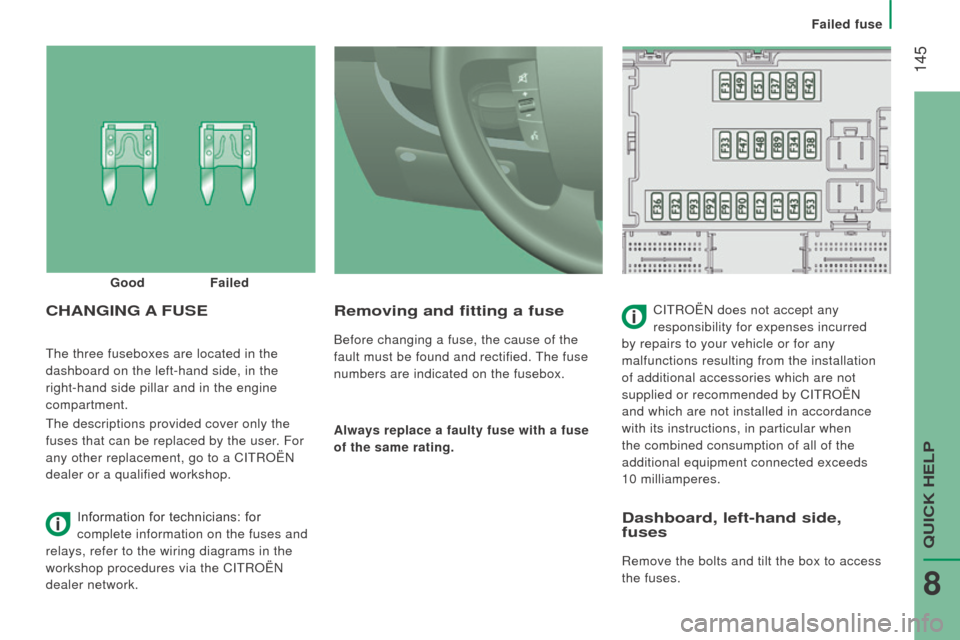
145
jumper_en_Chap08_Aide-rapide_ed01-2015
The three fuseboxes are located in the
dashboard on the left-hand side, in the
right-hand side pillar and in the engine
compartment.
The descriptions provided cover only the
fuses that can be replaced by the user. For
any other replacement, go to a Ci T roën
dealer or a qualified workshop.
removing and fitting a fuse
Before changing a fuse, the cause of the
fault must be found and rectified. The fuse
numbers are indicated on the fusebox.
Always replace a faulty fuse with a fuse
of the same rating.
cHAnGInG A F u SECiTroën does not accept any
responsibility for expenses incurred
by repairs to your vehicle or for any
malfunctions resulting from the installation
of additional accessories which are not
supplied or recommended by C
i T roën
and which are not installed in accordance
with its instructions, in particular when
the combined consumption of all of the
additional equipment connected exceeds
10
milliamperes.
Good
Failed
Information for technicians: for
complete information on the fuses and
relays, refer to the wiring diagrams in the
workshop procedures via the C
i
T
roën
dealer network.
dashboard, left-hand side,
fuses
remove the bolts and tilt the box to access
the fuses.
Failed fuse
QUiCK HELP
8
Page 148 of 276
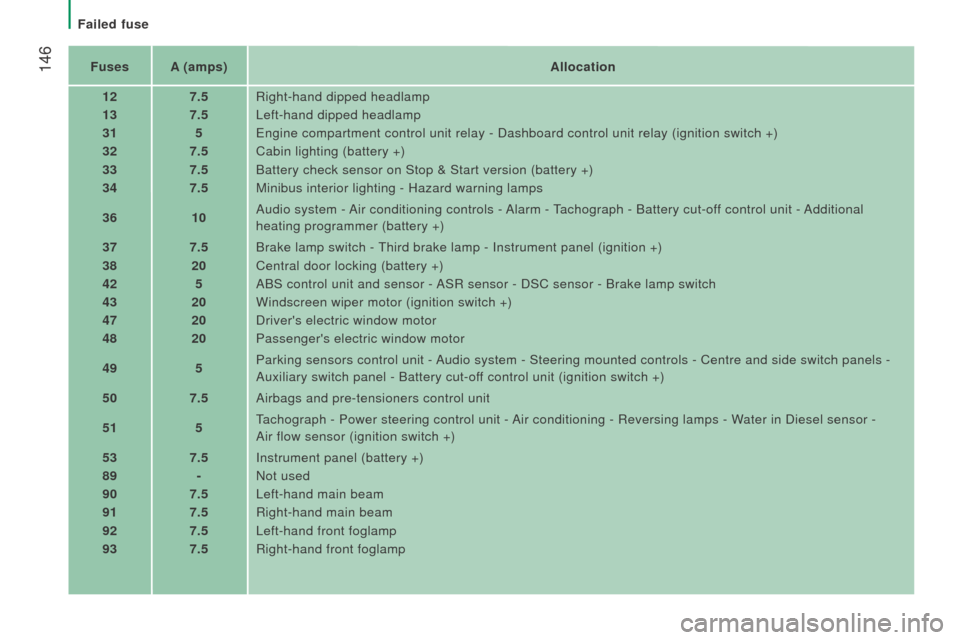
146
jumper_en_Chap08_Aide-rapide_ed01-2015
FusesA (amps) Allocation
12 7.5
r
ight-hand dipped headlamp
13 7.5Left-hand dipped headlamp
31 5Engine compartment control unit relay - Dashboard control unit relay (i\
gnition switch +)
32 7.5Cabin lighting (battery +)
33 7.5Battery check sensor on Stop & Start version (battery +)
34 7.5Minibus interior lighting - Hazard warning lamps
36 10Audio system - Air conditioning controls - Alarm - Tachograph - Battery cut-off control unit - Additional
heating programmer (battery +)
37 7.5Brake lamp switch - Third brake lamp -
i nstrument panel (ignition +)
38 20Central door locking (battery +)
42 5ABS control unit and sensor - AS
r sensor - DSC sensor - Brake lamp switch
43 20Windscreen wiper motor (ignition switch +)
47 20Driver's electric window motor
48 20Passenger's electric window motor
49 5Parking sensors control unit - Audio system - Steering mounted controls - Centre and side switch panels\
-
Auxiliary switch panel - Battery cut-off control unit (ignition switch +)
50 7.5Airbags and pre-tensioners control unit
51 5Tachograph - Power steering control unit - Air conditioning -
r eversing lamps - Water in Diesel sensor -
Air
flow sensor (ignition switch +)
53 7.5
i
nstrument panel (battery +)
89 -
n
ot used
90 7.5Left-hand main beam
91 7.5
r
ight-hand main beam
92 7.5Left-hand front foglamp
93 7.5
r
ight-hand front foglamp
Failed fuse
Page 149 of 276
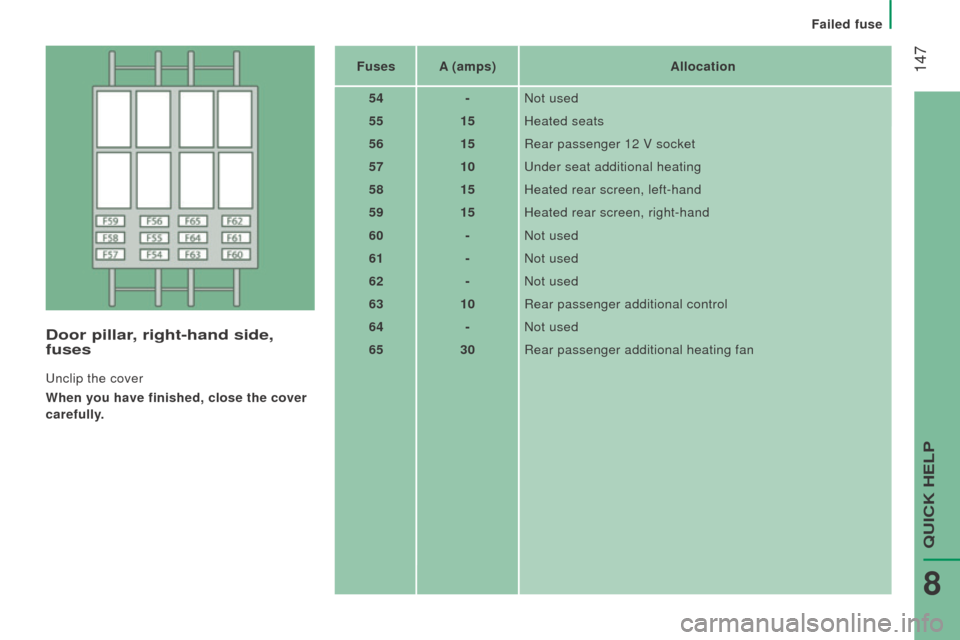
147
jumper_en_Chap08_Aide-rapide_ed01-2015
door pillar, right-hand side,
fuses
Unclip the cover
When you have finished, close the cover
carefully. Fuses
A (amps) Allocation
54 -
n
ot used
55 15Heated seats
56 15
r
ear passenger 12 V socket
57 10Under seat additional heating
58 15Heated rear screen, left-hand
59 15Heated rear screen, right-hand
60 -
n
ot used
61 -
n
ot used
62 -
n
ot used
63 10
r
ear passenger additional control
64 -
n
ot used
65 30
r
ear passenger additional heating fan
Failed fuse
QUiCK HELP
8
Page 150 of 276
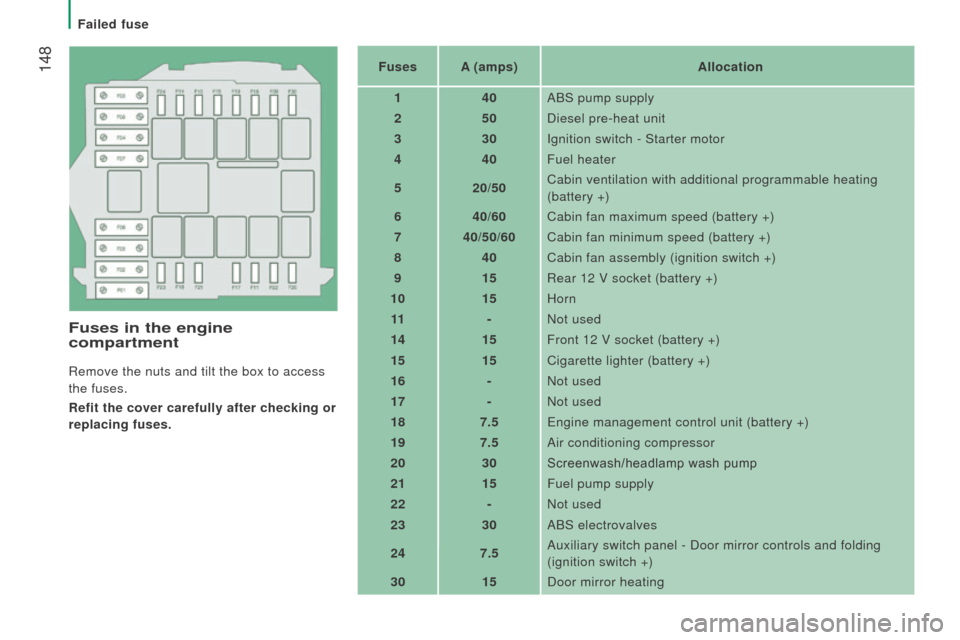
148
jumper_en_Chap08_Aide-rapide_ed01-2015
Fuses in the engine
compartment
remove the nuts and tilt the box to access
the fuses.
r
efit the cover carefully after checking or
replacing fuses. Fuses
A (amps) Allocation
1 40ABS pump supply
2 50Diesel pre-heat unit
3 30
i
gnition switch - Starter motor
4 40Fuel heater
5 20/50Cabin ventilation with additional programmable heating
(battery +)
6 40/60Cabin fan maximum speed (battery +)
7 40/50/60 Cabin fan minimum speed (battery +)
8 40Cabin fan assembly (ignition switch +)
9 15
r
ear 12 V socket (battery +)
10 15Horn
11 -
n
ot used
14 15Front 12 V socket (battery +)
15 15Cigarette lighter (battery +)
16 -n
ot used
17 -
n
ot used
18 7.5Engine management control unit (battery +)
19 7.5Air conditioning compressor
20 30Screenwash/headlamp wash pump
21 15Fuel pump supply
22 -
n
ot used
23 30ABS electrovalves
24 7.5Auxiliary switch panel - Door mirror controls and folding
(ignition switch +)
30 15Door mirror heating
Failed fuse